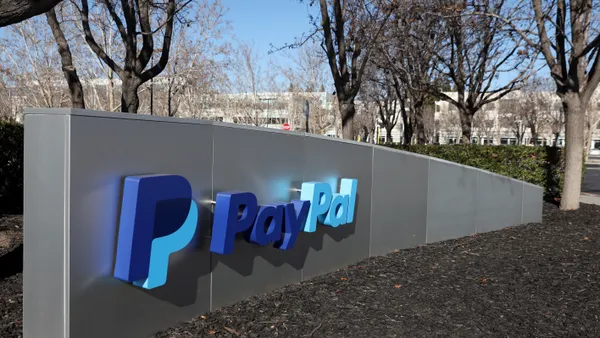Dive Brief:
- Global Payments may sell additional parts of its business following its announcement earlier this year to purchase the merchant acquirer Worldpay, the company’s CEO said during an earnings call with analysts Wednesday. That’s because the major $24.25-billion deal has rearranged the company’s view of the future.
- ”We are reevaluating portfolio composition decisions we made ([and shared at the September investor conference] in light of the Worldpay acquisition, and our expected strategic focus and vertical exposure post-closing,” Global Payments CEO Cameron Bready said during the company’s second-quarter earnings call.
- Global Payments acquired two small companies during the second quarter, including a Hong Kong-based digital payments software company and a fraud technology firm focused on the chargeback process, Bready told analysts, without naming the companies. A Global Payments spokesperson didn’t immediately respond to a request to identify the companies.
Dive Insight:
Global Payments is reassessing its options for divestitures following the announcement in April that it would buy Worldpay from the private equity firm GTCR and processor peer Fidelity National Information Services. At the same time, Global Payments said it would sell its issuer business to FIS for $13.5 billion.
The Atlanta-based Global Payments, which processes card payments for retailers and restaurants and provides other payments related services, aims to close the Worldpay deal in the first half of next year with integration work getting started already. Some 100 leaders from both two companies met recently to begin crafting their “integration roadmap,” Bready said during the call.
The company has been focused over the past year on unifying its point-of-sale hardware and services worldwide under the Genius brand as part of a broader strategic shift. The unified Genius marketing began during the second quarter.
“Our genius product family is more than simply a marketplace of point solutions — it's a fully integrated and seamless set of capabilities that can be deployed to clients of varying sizes through our modern, scalable, cloud based software,” Bready said during the call.
Still, some analysts are skeptical the company will be able to combat rival Fiserv’s Clover offering and upstart digital competitors such as Block’s Square and Toast. That’s despite revisions to the Global Payments salesforce approach as well.
“We are encouraged that Global is moving forward with its software-integrated POS, but we believe innovations will prove too little, too late in an increasingly competitive market,” William Blair analyst told their investment clients in a Wednesday note.
In addition to the sale earlier this year of the issuer business, Global Payments entered a May agreement to sell its payroll software business to Acrisure for $1.1 billion.
The sales are part of a Global Payments plan to return about $7.5 billion to shareholders through 2027. The effort has been helped along this year by tax cuts provided in President Donald Trump’s new tax-and-spending law.
“The one Big, Beautiful Bill Act obviously has tax provisions that improve our cash flows — that's how we're able to increase our overall expectation for share repurchases and capital returns,” Bready said. “So of that seven-and-half billion dollar number, we expect roughly an incremental half a billion of cash flow benefits coming from the one Big Beautiful Bill Act.”
When asked by one analyst for more detail about the potential additional divestures, Bready was coy, saying he didn’t want to infringe on the integrity of any future sale process. Nonetheless, he said the Global Payments-Worldpay business would consider its newly combined partners, exposure and market verticals.
“We are assessing whether any of the decisions we made prior to our September investor conference, we would take a different view of now in light of where the business is going,” the CEO said. “I think it's fair to say that there probably are some incremental things we would choose to do in light of the Worldpay transaction.”
The company’s second-quarter operating income, taking into account the issuer business sale, slid 10% to $427.2 million as revenue declined 7.6% to $1.96 billion, according to the company’s quarterly filing with the Securities and Exchange Commission. Net income for the quarter, including accounting for the transactions, shrunk by about a third to $241.6 million, the filing showed.














